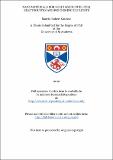Nanomaterials for solid oxide fuel cell electrolytes and reforming catalysts
Abstract
In this work, a broad range of analytical methods was applied to the study of the following three materials systems: yttria-stabilised zirconia (YSZ), samarium-doped ceria (SDC) and SDC-supported metal catalysts. YSZ and SDC were studied in the light of their application as solid electrolytes in Solid Oxide Fuel Cells. The SDC-supported metal catalysts were evaluated for application in the reforming of methanol.
The conductive properties of YSZ pellets derived from powders of different Y contents and particle size ranges were investigated using Impedance Spectroscopy (IS). Comparative studies of the crystallography (by X-ray Powder Diffraction (XRD)), morphology (by Scanning and Transmission Electron Microscopy (SEM, TEM)), chemical composition (by Energy Dispersive X-ray Spectroscopy (EDX) and Inductively Coupled Plasma Mass Spectroscopy (ICP-MS)) and sintering behaviour (dilatometry) were employed in the overall assessment of the conductivity results collected.
Detailed studies of three SDC compositions were performed on nanopowders prepared by a low temperature method developed in the Baker group. Modifications led to a simple and reliable method for producing high quality materials with crystallites of ~10 nm diameter. The products were confirmed by XRD and TEM to be single-phase materials. Thermogravimetric analysis, dilatometry, specific surface area determination, elemental analysis and IS were carried out on these SDC powders. The relationships between particle size, chemical composition, sintering conditions and conductivity were studied in detail allowing optimum sintering conditions to be identified and ionic migration and defect association enthalpies to be calculated.
Finally, the interesting results obtained for the SDC nanopowders were a driving force for the preparation of SDC-supported metal catalysts. These were prepared by three different methods and characterised in terms of crystallographic phase, specific surface area and bulk and surface chemical composition. Isothermal catalytic tests showed that all catalysts had some activity for the reforming of methanol and that some compositions showed both very high conversions and high selectivities to hydrogen. These catalysts are of interest for further study and possibly for commercial application.
Type
Thesis, PhD Doctor of Philosophy
Collections
Items in the St Andrews Research Repository are protected by copyright, with all rights reserved, unless otherwise indicated.

